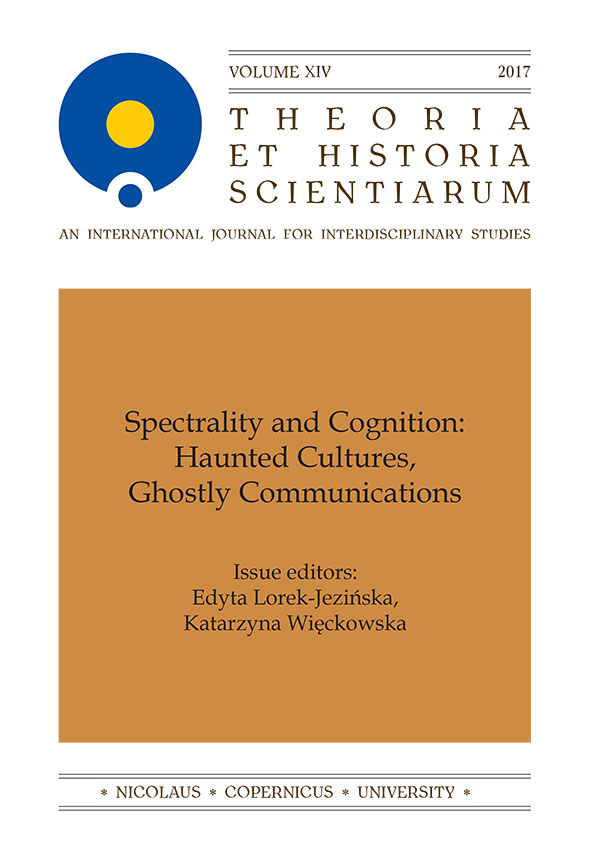Hauntology and Cognition: Questions of Knowledge, Pasts and Futures
DOI:
https://doi.org/10.12775/ths.2017.001Keywords
hauntology, cognition, spectres, memory, trauma, ethics, otherness, textualityAbstract
This article presents the major aspects of hauntology, highlighting the impact of spectrality studies on contemporary redefnitions of knowledge and cognition. Referring predominantly to Jacques Derrida’s Spectres de Marx (1993), we discuss the ways in which the spectral turn has led to a “cognitive crisis” of sorts by radically questioning the existing procedures of knowing and re-confguring the prevalent conceptualization of time and history. Approaching the spectre as a conceptual site of difference and otherness, we comment on the ethical dimensions of spectrality studies and the questions of (in)visibility, representation of as well as responsibility for the Other, the marginalised or the silenced. We also stress the contribution of the psychoanalytic concepts explaining psychological reactions to loss—the metapsychic phantom and the intrapsychic crypt—to the development of trauma and memory studies. In all of these concerns, we are primarily interested in outlining the transformative potential of the fgure of the spectre and its influence on methods of study in contemporary scholarship.
References
Abraham, N. (1994). “Notes on the Phantom: A Complement to Freud’s Metapsychology” (1975). In: N. Abraham and M. Torok. The Shell and the Kernel: Renewals of Psychoanalysis. Ed. and trans. N. T. Rand. Chicago: University of Chicago Press. 171–176.
Abraham, N. and M. Torok. (1994). “Mourning or Melancholia: Introjection versus Incorporation” (1972). In: N. Abraham and M. Torok. The Shell and the Kernel: Renewals of Psychoanalysis. Ed. and trans. N. T. Rand. Chicago: University of Chicago Press. 125–138.
Alexander, F. J. (2004). “Towards a Theory of Cultural Trauma.” In: J. F. Alexander, R. Eyerman, B. Giesen, N.J. Smelser, P. Sztompka. Cultural Trauma and Collective Identity. Berkeley: University of California Press. 1–30.
Anderson, M. L. (2013). Spectrality in the Novels of Toni Morrison. Knoxville: University of Tennessee Press.
Bauman, Z. (1994). Alone Again: Ethics after Certainty. London: Demos.
Bergland, R. L. (2000). The National Uncanny: Indian Ghosts and American Subjects. Hanover and London: University Press of New England.
Blanco, M. P. and E. Peeren. (2013a). “Introduction: Conceptualizing Spectralities.” In: M. P. Blanco and E. Peeren, eds. The Spectralities Reader: Ghosts and Haunting in Contemporary Cultural Theory. London: Bloomsbury. 1–27.
Blanco, M. P. and E. Peeren. (2013b). “Spectropolitics: Ghosts of the Global Contemporary / Introduction.” In: M. P. Blanco and E. Peeren, eds. The Spectralities Reader: Ghosts and Haunting in Contemporary Cultural Theory. London: Bloomsbury. 91–101.
Buse, P. and A. Stott. (1999). “Introduction: A Future for Haunting.” In: P. Buse and A. Stott (eds). Ghosts: Deconstruction, Psychoanalysis, History. Basingstoke: Macmillan. 1–20.
Castle, T. (1993). The Apparitional Lesbian: Female Homosexuality and Modern Culture. New York, Chichester: Columbia University Press.
Culler, J. (1998). On Deconstruction: Theory and Criticism after Structuralism. London: Routledge.
Davis, C. (2005). “État Présent: Hauntology, Spectres and Phantoms.” French Studies 59/3 (July): 373–379. https://doi.org/10.1093/fs/kni143, 24.08.2016.
Derrida, J. (1994). Specters of Marx: The State of the Debt, the Work of Mourning, and the New International. Trans. P. Kamuf. New York: Routledge.
Derrida, J. and B. Stiegler (2013). “Spectrographies.” In: M. del Pilar Blanco and E. Peeren, eds. The Spectralities Reader: Ghosts and Haunting in Contemporary Cultural Theory. London: Bloomsbury. 37–51.
Gordon, A. F. (2004). Ghostly Matters: Haunting and the Sociological Imagination. Minneapolis: University of Minnesota Press.
Jameson, F. (2008). “Marx’s Purloined Letter.” In: M. Spinker, ed. Ghostly Demarcations: A Symposium on Jacques Derrida’s Specters of Marx. London: Verso. 26–67.
Lorek-Jezińska, E. (2013). Hauntology and Intertextuality in Contemporary British Drama by Women Playwrights. Toruń: Nicolaus Copernicus University Press.
Luckhurst, R. (2013). “From The Contemporary London Gothic and the Limits of the ‘Spectral Turn.’” In: M. del Pilar Blanco and E. Peeren, eds. The Spectralities Reader: Ghosts and Haunting in Contemporary Cultural Theory. London: Bloomsbury. 75–88.
Rand, N. T. (1994). “Editor’s Note.” In: N. Abraham and M. Torok. The Shell and the Kernel: Renewals of Psychoanalysis. Ed. N. T. Rand. Chicago: University of Chicago Press. 165–169.
Royle, N. (2003). The Uncanny. Manchester: Manchester University Press.
Torok, M. (1994). “The Illness of Mourning and the Fantasy of the Exquisite Corpse” (1968). In: N. Abraham and M. Torok. The Shell and the Kernel: Renewals of Psychoanalysis. Ed. and trans. N. T. Rand. Chicago: University of Chicago Press. 107–124.
Weinstock, J. A. (2004). “Introduction: The Spectral Turn.” In: J. A. Weinstock, ed. Spectral America: Phantoms and the National Imagination. Madison: University of Wisconsin Press / Popular Press. 3–17.
Więckowska, K. (2014). Spectres of Men: Masculinity, Crisis and British Literature. Toruń: Nicolaus Copernicus University Press.
Wolfreys, J. (2002). Victorian Hauntings: Spectrality, Gothic, the Uncanny and Literature. Basingstoke: Palgrave.
Downloads
Published
How to Cite
Issue
Section
Stats
Number of views and downloads: 1632
Number of citations: 0



